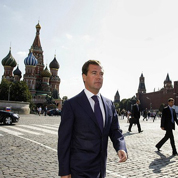Medvedev’s precise diagnosis of Russia’s problems indicates readiness to solve them

Last month, President Dmitry Medvedev — in an unprecedented piercing review of Russia’s history and its failures by a sitting head of states of affairs in their industries. Added to these woes are the post-Soviet social security system, Russia’s immature democracy, the escalating negative demographic trends and the highly volatile Caucasian Region, etc. All these and other thorny issues, taken together, according to the president, are highly excruciating, even for such a large and resources-rich country as Russia.
Consequently, the role of today’s Russia in major global issues, unlike in the Soviet era, has become very limited, much far less than the level that it ought to be, given its economic potential, political might and decisive influence on landmark issues in world history. It is such gaping discordance, between means and roles, that highlights the urgency in the president’s agenda for a new, modernized Russia that is capable of judiciously tapping on its colossal natural resources, solid industrial potentials, outstanding achievements in fundamental and applied sciences, technology, arts and culture to leveraging its currently latent influence on the continental and global arenas that are commensurate to its real status.
The president did not only list the problems, but also the ways to solve them via what he has labeled ‘five key strategic vectors’ built on Russia’s areas of traditional competitive advantages for full-scale modernization of the country and its economy. These include energy, notably, oil and gas, where Russia, already a behemoth on the global oil markets, plans to become the runaway leader in terms of effectiveness in production and transportation of energy resources and a pacesetter in the search for and introduction of new types of fuels to the global markets. Other ‘vectors’ include nuclear technologies, where Russia is currently among the top global players, applied computer sciences and edge-cutting information technologies, including the developments of the so-called ‘super-gigantic’ computing machines that are invaluable in modeling new economic trends and solving related issues.
Also incorporated in the Kremlin’s ‘must-dos’ list are land- and space-based data transfers technologies, including the development of Russian analogs of the famous U.S. GPRS gadgets capable of monitoring both civilian and military objects across the globe for the benefit of the scientific researches, agricultural use and industrial outputs in all sectors of the Russian economy. Finally, Russia will also aspire to assume leadership positions in medicine and related sciences that will enable it to produce the most advanced medical equipment and most effective drugs for diseases of different etiologies. The president, a pragmatic politician, is fully aware of the gross enormity of the tasks ahead, but at the same time, has remained undaunted in his self-declared mission, calling the set objectives ‘very realistic, though complicated, but entirely achievable’ as the detailed frameworks for their accomplishments have long being worked out.
It is too early to tell whether the president will really achieve these objectives, but that notwithstanding, he does deserve praise for this precise diagnosis of Russia’s current malaise. This is because from the times of Hippocrates, diagnosing a disease correctly has always been tantamount to finding 50% of its effective cure. Therefore, using this barometer, it will not be an overstatement to say that Medvedev, by accurately outlining the current problems inflicting his country and the realistic means of their resolutions, can be said to have already solved half of Russia’s most recalcitrant issues that have defied both accurate diagnosis and effective resolutions for centuries.












 Web design,
Web design,